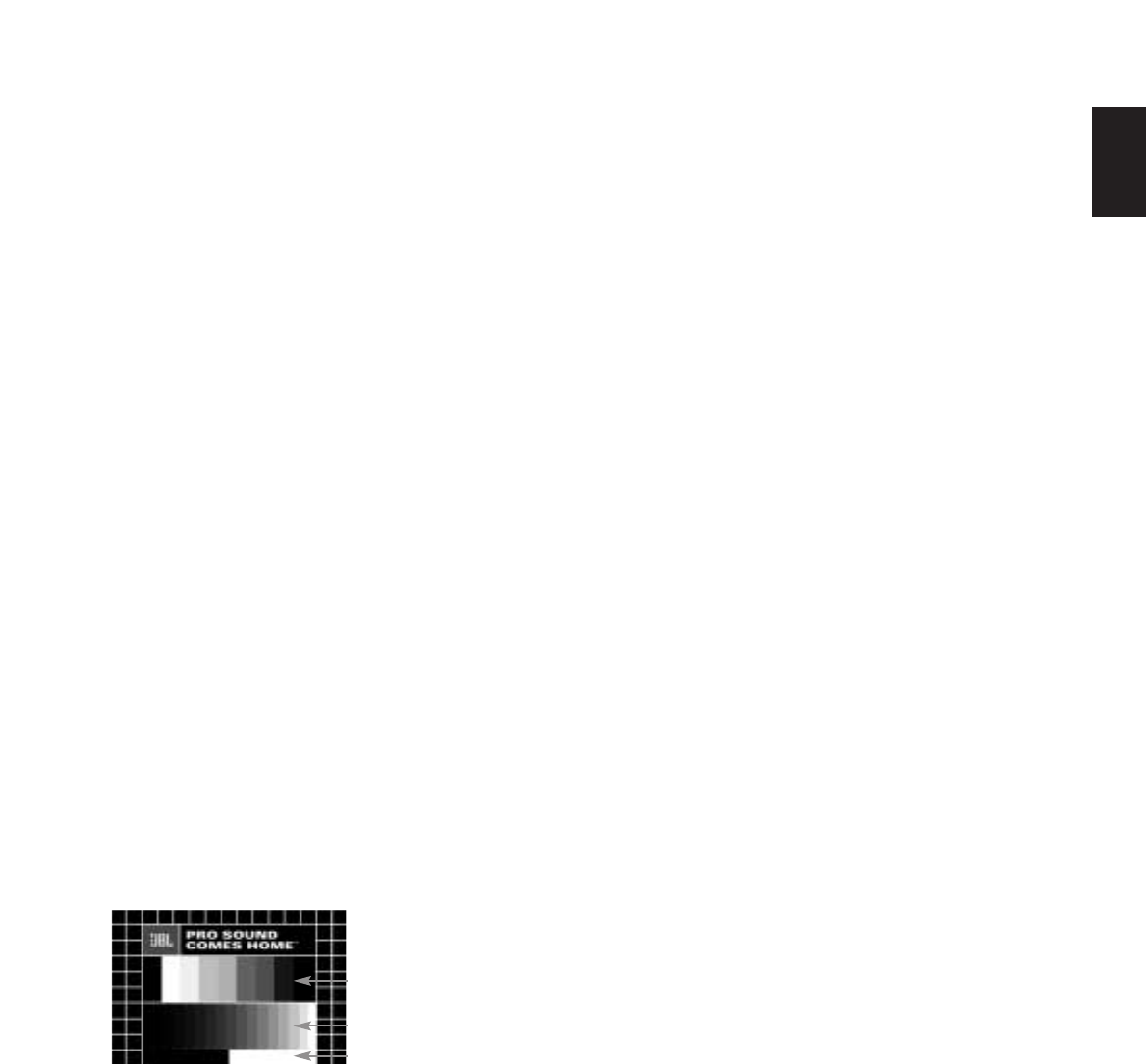
17
ENGLISH
TEST SCREEN
Test Screen
When you activate the Test Screen via
the OSD you can activate a still image
to test all settings and the video
performance of your TV. With the
vertical color bars you can test the
following:
• proper color intensity on your TV,
• the proper color of each bar,
showing if the proper video standard
is turned on: the colors should be
(left to right): black, white, yellow,
cyan (turquoise), green, magenta
(purple), red, blue, black.
• proper color transition, seen as
sharp separation of the bars, S-Video
will be better than Video, RGB best of
all.
• the performance of the color filter in
your TV (with ”Video” signals), bar
edges should show no vertical
crawling dots. Here S-Video and
RGB formats usually give no
problems.
With the gray scale and the
black/white fields below the color
bars the brightness and contrast of
your screen can be adjusted optimally,
see ”TV Picture Adjustment” below.
TV Picture Adjustment with
Test Screen
These adjustments may be done now,
but you can also make them after
setup has been finalized.
Brightness adjustment:
1. Turn down the color control on your
TV until the color bars are visible in
black and white.
2. Adjust the contrast to the lowest
level where you still can see all bars
within the grey scale in the test
picture separately and clearly.
3. Adjust the Brightness so that the
bars in the gray scale are all visible.
The bar furthest to the left has to be
as black as possible rather than
gray but the next must be clearly
distinguishable. All the bars in the
gray scale have to be gradually and
evenly changing from black to
whiter, from left to right.
Contrast adjustment:
1. Adjust the contrast on your TV until
you see a bright white bar in the
lower right corner of the screen and
a deep dark black bar at the left.
The optimal contrast setting will
depend on your preference and the
surrounding light in the TV room.
2. If the brightness of the white bar
does not increase while turning up
the contrast or when the borders of
the white letters on top bloom
(overlight) into the black areas,
drastically decreasing the
sharpness of the script, then the
Contrast has been turned up too
much. Reduce the contrast until
these effects disappear and the
video still looks realistic.
3. If you are watching TV in daylight,
adjust the Contrast so that a normal
video picture has about the same
look as the surroundings in your
room. This relaxes the eye when
watching the TV picture. This
contrast setting may be reduced
when the surrounding light is
dimmed, usually improving
sharpness.
4. The gray scale in the middle line
needs to have the same clear
difference between each bar as
before the contrast adjustment. If
not, go back to the brightness
adjustment and repeat step 3 and
then the contrast adjustments,
making only minor adjustments
each time for optimisation.
Color adjustment.
1. When Brightness and Contrast are
set optimally, turn up the color
control. Adjust to the level where
the colors look strong but still
natural, not overdone. If the color
level is too high, depending on the
TV used some of the bars will seem
wider or the color intensity will not
increase when the control is turned
up. Then the color control must be
reduced again. At the end you
should test the color intensity also
with a video, e.g. pictures of natural
faces, flowers, fruit and vegetables
and other well known natural
articles for an optimal setting of the
color intensity.
2. If your TV has a Tint option (with
most European TVs this is available
or effective only with NTSC signals,
not with PAL), use the large white
bar below the Grayscale to tweak
the warmth of the picture. Every
viewer has a difference in
preference. Some prefer a little
colder picture, some a warmer
glow. The Tint function on your TV
and the white bar can be used to
control this. Adjust the Tint to the
level where you feel the white color
has the tone you prefer.
Color Bars
Grey Scale
100% Black/
White fields


















